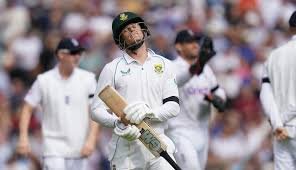‘Poor’ powerplay tallies hide how smart Lions were as Rassie in rich form 0
The DP World Lions scored the least number of runs in the powerplay out of all the teams in the CSA T20 Challenge, and yet they went on to top the log and win the competition in convincing fashion, which points to how smart their cricket was, and in the last two weeks it had a lot to do with the riches of experience brought to the number three position by Rassie van der Dussen.
The final at the DP World Wanderers Stadium last weekend was a case in point. The Momentum Multiply Titans went hard in the powerplay and consequently made a poor start on a tricky pitch, crashing to 34 for three in the first six overs. That became 54 for six in the ninth over and our DP World Lions were in a powerful position early in the game.
“Aiming for around 40 in the powerplay has served us well,” head coach Russell Domingo said after claiming the title with a clinical eight-wicket win with 29 balls to spare. “I’m a bit old-fashioned in that I like to have wickets in hand, be more circumspect up front, especially at the DP World Wanderers where the ball does a bit. A lot of people think the first six overs are the most important, but I think the last six are.”
Van der Dussen has epitomised that smart cricket since he returned to the team from duty overseas for the last two round-robin matches and then the playoffs – notching scores of 43 (off 33 balls), 59 (38), 40* (37) and 44 not out in the final off just 31 deliveries. That saw him to the top of the final batting averages with 186 runs at an average of 93 and a healthy strike-rate of 133.81.
“We know how to play at the DP World Wanderers and it’s not as if the pitch gets better in the second innings. So in the first 10 overs we’ve been happy to be around run-a-ball as long as we’re not too many wickets down, because from 60 for six there is no coming back, like we saw in the final,” Van der Dussen said.
“So we’re happy if we’re 60 for two or three at halfway because then we are set up to get 160/170. We’re really trying to guard our wickets. At a place like SuperSport Park, where it’s really flat and the ball flies, you can take on the powerplay and you can be 70 after six overs. But we use our home advantage.
“I’m happy playing a certain way and I do have a few years of experience. My stats get nit-picked and it’s been said that I don’t score enough runs in my first few balls. So I’ve had to find the balance between righting those stats and the fact that I really want to win. I will do whatever is needed to win, whatever it takes to get to the playoffs. People use stats in whatever way suits them, but there’s only one thing that’s always at the forefront of my mind and that’s what’s needed to win in the current situation. I love playing for the Lions and I just want them to win,” Van der Dussen said.
The other obvious feature of our DP World Lions’ triumph was how the absence of Proteas stars like Temba Bavuma, Ryan Rickelton, Wiaan Mulder and Kagiso Rabada did not stop the charge of #ThePrideOfJozi to the title.
“It’s been great to see that despite having lost Ryan, Temba, KG and Wiaan to the Proteas, and myself, Reeza Hendricks, Nqaba Peter and Bjorn Fortuin at the start, we were still able to defend our title,” Van der Dussen said. “To see others coming in has been fantastic, like Junaid Dawood, who still finished as the leading wicket-taker in the competition, with Kwena Mapahaka, even though he didn’t play the last few games.
“That’s always our challenge at the DP World Lions, to rectify the loss of our Proteas, to fill the gaps. Russell communicated with us at the start of the season that it was not a long tournament, so he also had to balance giving guys playing opportunity. The back-up guys also need to get game-time, you need to give them responsibility so we can see what we’ve got after the internationals.
“They have filtered in really well and it’s been a totally different team to win the competition this season. And it’s been great to see the same principles that we aspired to last season – things like work ethic, not getting ahead of ourselves and there being no egos, speaking the same language – have been there again.
“But when you have leaders like Jono Leaf-Wright and Russell Domingo, then they keep you so grounded. Jono is just the best human being and Russell is always really direct and honest with us,” the veteran stalwart of #ThePrideOfJozi said.
